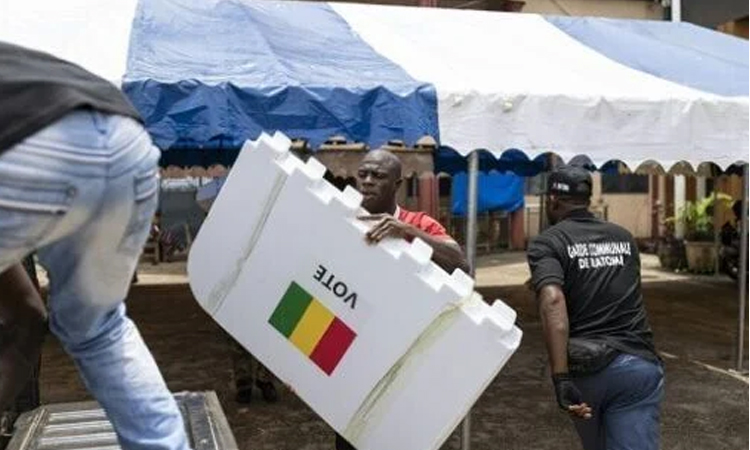News Flash
News Flash

CONAKRY, Sept 21, 2025 (BSS/AFP) - Guineans began casting ballots Sunday on a draft constitution that would pave the way for elections but also permit the junta leader who seized power four years ago to run for president, in a referendum boycotted by the opposition.
The vote, which Guineans and the international community have been awaiting for years, opens the way for stalled political elections in the West African nation.
The country has been ruled by General Mamady Doumbouya since he overthrew elected civilian president Alpha Conde in 2021.
Some 6.7 million Guineans will be able to cast a ballot, out of a population of approximately 14.5 million people.
There was a heavy security presence on the streets of Conakry as polls opened Sunday morning, with armoured vehicles and police checkpoints inspecting vehicles in the city centre.
At a school in the capital's Kaloum district, several dozen people queued as polls monitored by security forces opened at 7 am (0700 GMT), according to AFP journalists.
"I came to vote of my own free will," said 23-year-old student Ahmad Diallo, with his voter card in hand.
"This is what everyone is waiting for: to have peace and we want the transition to end."
First time voter Aisha Camara, 20, told AFP she believed the new constitution was "a good thing for Guinea" adding that she "came to support President Doumbouya".
After polls close at 6:00 pm, results are not expected until Tuesday evening at the earliest, according to the country's election body.
- Security measures -
Authorities are deploying no fewer than 45,000 members of the defence and security forces across the country Sunday to secure the vote, along with 1,000 light and armoured vehicles and combat helicopters, the National Gendarmerie said.
Guinea's military initially pledged to return power to civilians before the end of 2024.
Although its authorities are now promising presidential and legislative elections before the end of the year, the junta has not yet set a date.
Campaigning has been strong in the referendum's "yes" camp: rallies, marching bands and posters depicting 40-year-old Doumbouya have been prevalent throughout the country.
The "no" campaign, however, was virtually non-existent, mainly taking place on social media and often led by the junta's critics abroad who fled the country's crackdown on dissent.
Since 2022, the junta has banned demonstrations and has arrested, prosecuted or pushed into exile several opposition leaders, some of whom were victims of forced disappearances.
On August 23 the junta suspended two of the country's main opposition parties for three months.
Several media outlets have additionally been suspended and journalists arrested, creating a climate of fear in the press.
- Electoral 'charade' -
Given that context, Guinea's opposition has called on voters to stay home, denouncing the vote as a "charade" for the junta to keep its hold on power, with the referendum's outcome determined in advance.
If adopted, the new constitution would replace a "transition charter" established by the military government, which had prevented the junta's leaders, government members and heads of institutions from standing in elections.
The stipulation does not exist in the draft constitution, thereby paving the way for a presidential run by Doumbouya. All signs point to him standing for office.
The draft also requires candidates be between 40 and 80 years of age and have their primary residence in Guinea -- effectively excluding two of the main opponents.
Former president Conde, 87, is living in exile in Istanbul, while opposition leader and ex-prime minister Cellou Dalein Diallo, age 73, lives in Dakar and Abidjan.
Since Guinea's 2021 coup, it has remained suspended from the African Union (AU).
Meanwhile the Economic Community of West African States (ECOWAS), which sent a mission to Guinea in recent days, has not invited it to participate in its heads of state meetings.
Writing on X, the UN Human Rights Office of the High Commissioner urged "the military authorities to ensure Sunday's constitutional referendum is peaceful & transparent".
It added that "recent bans on political parties & media outlets raise serious questions about inclusiveness & free participation for all".